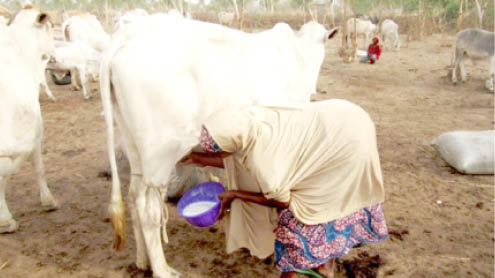Food production in Nigeria is declining because many commercial farms are now moribund due to security challenges in many parts of the country, Daily Trust findings have revealed.
Some of the farms are visible along major highways across the country, such as the Abuja-Kaduna expressway, Abuja-Keffi-Jos expressway, Abuja-Lokoja highway, Zaria–Funtua-Gusau road, and a host of others.
Most of them have closed shop due to banditry and kidnappings, the owners said.
A member of the Kaduna State House of Assembly, who owns a farm in Birnin Gwari LGA, but prefers to remain anonymous, said he has abandoned his farm due to the activities of bandits.
- Nigerian pilgrims task Hajj managers on excellent services
- Food crisis worsens as inflation soared to 33.69% in April
“I have no choice but to cease visiting the farm. Before assuming office, I used to regularly check on the workers and witness the farm’s flourishing state, but not anymore,” he said.
Similarly, Imam Hussaini Udawa, who owns a large farm on the Kaduna-Niger State boundary, has abandoned the farm out of fear.
He expressed regret over the closure of his farm, which has also resulted in his workers losing their jobs.
“I was forced to shut down the farm from which I used to harvest over 500 bags annually. For years, the area has been overrun by bandits, and we have no option but to vacate the place,” he said.
Udawa said the continued closure of big farms could exacerbate food the security challenges and lead to widespread hunger.
He also pointed at the closure of many commercial banks in the state as a testament to the severity of the situation.
Hajiya Mairo Ahmadu, a civil servant, shared her family’s ordeal, saying that her father had to abandon his large farm in Sokoto due to insecurity.
“It was a big farm where cattle were raised for milk production and sale. However, due to bandits’ activities, he dares not visit the farm,” she said.
She said her father was frustrated because, despite substantial investments in the farm, he was unable to oversee his ventures due to security concerns.
A rice farmer, who would not want his name mentioned in the media, told Daily Trust that he was forced to abandoned 1,000 hectares of rice field in Shendam LGA of Plateau State because of the attempt by kidnappers to abduct him on the farm.
Daily Trust also gathered that a company that acquired large hectares of land at the federal government’s Gurara irrigation site, about 30km away from Abuja, has also abandoned production due to insecurity threatening its staff.
In Taraba State, our correspondent reports that some commercial and medium-scale farmers have also been affected by the crisis.
Bashir Haman, who farms around Kwando area in Ardo-Kola LGA, said he was forced to abandon his large maize farm last year because of the activities of bandits.
He said he had a large farm located close to a mountain at Kwamando area, but he and other farmers were chased away by bandits when they were about to harvest their crops.
According to him, he had to hire hunters to provide security backup before he could harvest the maize on his farm.
Another farmer, a civil servant, said he had a big farm in the same area and had to pay the bandits huge sums of money before the labourers he hired to harvest his maize were allowed access to the farm.
The civil servant said he would not farm on that land this farming season until the security situation fully improves.
In Benue State, where insecurity, occasioned by banditry has sacked many food-producing communities, big-time farmers have equally abandoned their farms in flashpoint areas.
A farmer, Vitalis Tarnongu, was almost killed at one of his farms sometime last year.
He was injured on his head and other parts of his body.
Tarnongu, who cultivates rice, cowpea, soybean and cassava, luckily survived the injuries after he was rushed to the teaching hospital in Jos, Plateau State, where he spent about six months.
He told our correspondent that he had also abandoned his farms in other locations.
“I cleared land, prepared nursery for rice at Tse-Abata, near Yogbo, in Guma LGA but abandoned it due to insecurity.
“I have a cassava farm at Nyiti village, Naka road, which was at an advanced stage but that had been turned into a football field,” Tarnongu said.
For Omakwu Madaki, a commercial farmer in Umogidi village of Adoka district in Otukpo LGA, his farming activities on a 600 hectares expanse of land came to a standstill since the past one year following attacks by armed herders.
Madaki said, “I cultivate rice and cassava on a large scale because the land is quite vast but ever since the insurgency began in our area, in April last year, when they (herders) came and killed about 50 in one day, our people deserted the area.
“We lost a whole lot of cassava because we couldn’t harvest at the time,” he stressed.
Daily Trust reports that insurgency has also thrown many farmers away from their farms in Yobe State.
Similarly, the decision of the authorities to stop the supply of fertilisers, to curtail the production of Improvised Explosive Devices (IEDs) by terrorists, had also affected crop production in the state.
Bukar Adamu, a farmer in Goniri town, Gujba LGA, said many farmers in the area were affected.
Abubakar Bulama, a sesame farmer in Geidam LGA of the state, told Daily Trust that urea fertiliser was very important in farming activities; adding that banning it by the security agencies has affected rice yields.
However, Abdulrahman Ali Musa, an agronomist, said smallholder farmers also bear the brunt of insecurity, stressing that the issue of big-time farmers is not an exclusive challenge.
He said while some large-scale farmers could afford to hire security personnel to safeguard their farms, smallholders lacked such resources.
We’re seriously affected – Farmers’ union
Architect Kabiru Ibrahim, who is the National President of the All Farmers Association of Nigeria (AFAN), said there was “a partial or total collapse of commercial farming in the North Central, North West and North East, largely due to insecurity.”
He also said beyond insecurity, production cost, lack of sustainable credit, low mechanisation and climate change, among others, were also contributing to the problem.
“The government must intervene to grant more subsidies and provide adequate security to these large commercial farms to enable them to scale up productivity, and get them back on course,” he said.
Experts speak
Amos Banda, an independent agricultural economist based in Kano, said most of the affected places were the hubs of food production that houses most of the commercial farms that have been contributing to the nation’s food production capacity.
He said the unfortunate closing down of these farms due to insecurity in the North was partly responsible for the high cost of food in the country.
“If the truth is to be told, what Nigerians are currently facing is the aftermath of the closure of these commercial farms. It is apparent that their contribution towards food production in the country at large is very significant and their forceful closure means a decline in the nation’s agricultural production capacity,” he said.
Another agricultural economist, Malam Isma’ila Bello, said the current insecurity in the northern part of the country has forced most commercial farms to close down irrespective of their output, adding that those that are still operating are doing so with a high increase in their production costs because they have to hire extra security personnel to man their farms.
“Let me tell you something. If you go to Gujba in Yobe State, you will cry because the sight of the multi-billion-naira ultra-modern commercial farms owned by an individual has been abandoned due to insecurity.
“It is the same at Anchau in Kaduna State and some other places. Sadly, hundreds of people have also lost their means of income as well as decline in individuals’ income. Personally, I believe opening the borders won’t solve anything. We must secure our farmlands,” he said.
Agro rangers would soon be deployed – FG
Officials of the Federal Ministry of Agriculture said the government was doing everything possible to ensure farms were protected.
A director with the ministry, who craved anonymity, said the agro rangers from the Nigerian Security and Civil Defence Corps (NSCDC) would soon be deployed to guard commercial farms across the country.

 Join Daily Trust WhatsApp Community For Quick Access To News and Happenings Around You.
Join Daily Trust WhatsApp Community For Quick Access To News and Happenings Around You.


